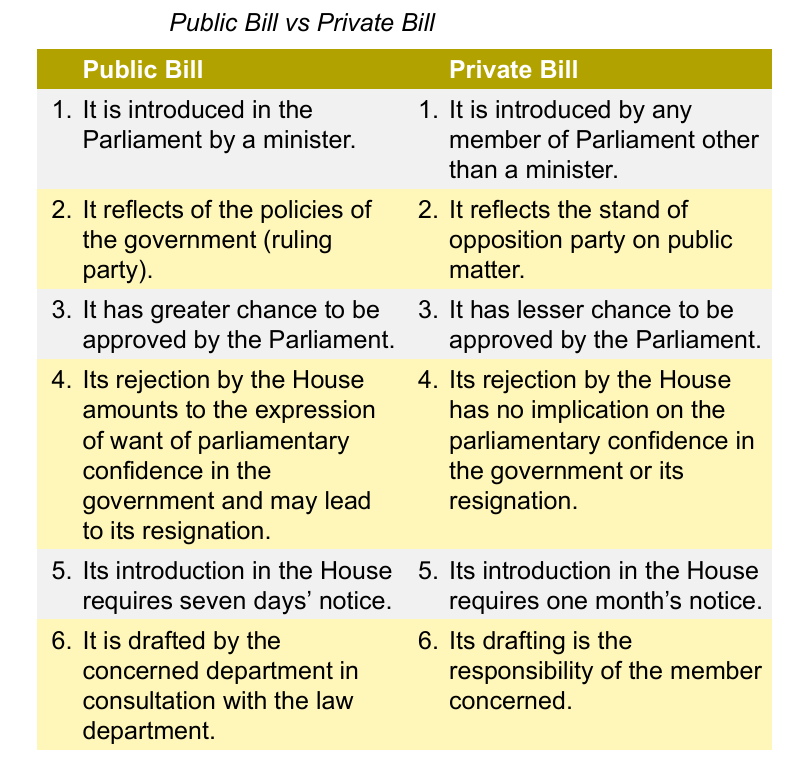Important Facts For Prelims
Decline of Private Members' Bills in Indian Parliament
- 03 Jan 2025
- 6 min read
Why in News?
In recent years, Private Members' Bills, crucial for Members of Parliament (MPs) independent expression, have been sidelined in India's Parliament due to limited time allocation.
- The 17th Lok Sabha (June 2019 to February 2024) saw a sharp decline in time spent on these bills, raising concerns about the diminishing role of individual MPs and the health of parliamentary democracy.
What is the Private Members' Bill?
- About: Private Members' Bills are proposed by MPs who are not Ministers (i.e., not part of the government), allowing them to introduce laws or amendments on issues important to their constituencies.
- Key Features: Only non-government MPs can introduce these bills, offering a chance for independent legislative proposals.
- MPs can also introduce resolutions to call attention to specific matters.
- Procedure:
- Drafting and Notice: MPs draft and submit bills with at least one month's notice.
- Introduction: Bills are introduced in Parliament, followed by initial discussions.
- Debate: If selected, bills are debated, typically in limited Friday afternoon sessions.
- Decision: Bills may be withdrawn or proceed to a vote.
- Significance: These bills provide a platform for MPs to express themselves without party pressure, often on crucial or controversial matters.
- A historical example is the bill introduced by H.V. Kamath in 1966 after the death of Prime Minister Lal Bahadur Shastri, seeking to amend the Constitution to make only Lok Sabha members eligible for the post of Prime Minister.
- Only 14 Private Members' Bills have been passed since independence, and none have passed since 1970.
- The Rights of Transgender Persons Bill, 2014, became the first private member's bill approved by the Rajya Sabha in 45 years but lapsed without reaching the Lok Sabha.
Why is there a Decline in Private Members’ Bills?
- Lack of Time and Attention: Data from PRS Legislative Research reveals that the 17th Lok Sabha allocated just 9.08 hours to Private Members' Bills, while the Rajya Sabha spent 27.01 hours, a fraction of total session hours.
- In the 18th Lok Sabha's two sessions, only 0.15 hours were spent on such Bills in the Lower House and 0.62 hours in the Rajya Sabha, with minimal time on resolutions.
- Friday scheduling of Private Members' business limits discussion as many MPs leave for constituencies, shrinking its window further.
- The decline of these bills can be attributed to MPs' lack of seriousness, with many skipping discussions.
- Revival of Private Members’ Bills: Shifting Private Members’ Bills to midweek could boost participation and discussions.
- Protect the constitutional space for individual parliamentary expression and encourage MPs to actively participate in their proposed bills.
UPSC Civil Services Examination, Previous Year Questions (PYQs)
Prelims
Q With reference to the Parliament of India, consider the following statements: (2017)
- A private member’s bill is a bill presented by a Member of Parliament who is not elected but only nominated by the President of India.
- Recently, a private member’s bill has been passed in the Parliament of India for the first time in its history.
Which of the statements given above is/are correct?
(a) 1 only
(b) 2 only
(c) Both 1 and 2
(d) Neither 1 nor 2
Ans: (d)
Exp:
- The process of law making begins with the introduction of a Bill in either House of the Parliament. A Bill can be introduced either by a Minister or a member other than a Minister. In the former case, it is called a Government Bill and in the latter case, it is known as a Private Member’s Bill.
- In other words, a Private Member’s Bill is introduced by any member (elected or nominated) of Parliament other than a minister. One month’s notice period is required prior to its introduction. Its drafting is the sole responsibility of the member who introduces the bill. Hence, statement 1 is not correct.
- The first Private Member’s Bill passed by parliament was the Muslim Wakfs Bill, 1952, which aimed at providing better governance and administration of Wakfs. It was passed in 1954. Hence, statement 2 is not correct.
- The Rights of Transgender Persons Bill, 2014, passed by the Rajya Sabha in 2015 became the first private member’s bill to get the Rajya Sabha’s approval in the last 45 years. Therefore, option (d) is the correct answer.





